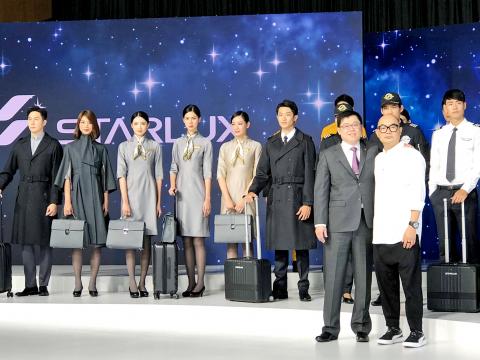Starlux Airlines Co (星宇航空) is to concentrate on operating routes from Taiwan to second-tier cities in Asia until mid-2021 to avoid head-to-head competition with the nation’s two major airlines in big cities, chairman Chang Kuo-wei (張國煒) said yesterday.
Starlux is to initially use five Airbus SE A321neo aircraft when it begins services next year, he said.
As the narrow-body aircraft have less capacity and is less efficient compared with the wide-body jets used by other airlines, it would be less competitive if it flies to big cities in Asia, he added.

Photo: Kao Shih-ching, Taipei Times
“We have to consider what kinds of airplanes our competitors use when choosing destinations. We do not want to play hardball with them,” Chang told a news conference in Taipei, where he introduced the uniforms for the airline’s pilots, flight attendants and ground staff.
Some passengers prefer twin-aisle aircraft when flying to big cities, which Starlux also took into account, he said.
StarLux has chosen Macau; Penang, Malaysia; and Da Nang, Vietnam; as its first three destinations when services start on Jan. 23, because they are second-tier cities, he added.
The airline would gradually expand its network to other second-tier cities in Asia next year, Chang said, adding that it would not fly to first-tier cities in Asia until after taking delivery of five A350-900 wide-body aircraft in 2021.
That means Starlux would not offer flights to Japan next year, even though it is one of the most-favored destinations for Taiwanese, he said, adding that Southeast Asia remains the biggest market for transfer business.
Starlux is to receive one Airbus A321neo later this month, which Chang said he would fly himself from Hamburg, Germany, to “make sure everything with the new plane is okay.”
The second and third A321neo aircraft would be delivered later this year and in early January before StarLux begins services, he said.
The airline is to take delivery of another two A321neos later next year and expects to receive a total of 12 airplanes — including A350s and A321neos — in 2021, which would be the highest number of deliveries in a single year in Taiwan, he added.
Starlux is confident that it would be able to beat rivals that also use single-aisle jets, as it has equipped its narrow-body aircraft with amenities typically offered only in wide-body jetliners, such as lie-flat business-class seats, Chang said.
It would provide free Wi-Fi service for all business and economy-class passengers, he added.

CHIP WAR: Tariffs on Taiwanese chips would prompt companies to move their factories, but not necessarily to the US, unleashing a ‘global cross-sector tariff war’ US President Donald Trump would “shoot himself in the foot” if he follows through on his recent pledge to impose higher tariffs on Taiwanese and other foreign semiconductors entering the US, analysts said. Trump’s plans to raise tariffs on chips manufactured in Taiwan to as high as 100 percent would backfire, macroeconomist Henry Wu (吳嘉隆) said. He would “shoot himself in the foot,” Wu said on Saturday, as such economic measures would lead Taiwanese chip suppliers to pass on additional costs to their US clients and consumers, and ultimately cause another wave of inflation. Trump has claimed that Taiwan took up to

A start-up in Mexico is trying to help get a handle on one coastal city’s plastic waste problem by converting it into gasoline, diesel and other fuels. With less than 10 percent of the world’s plastics being recycled, Petgas’ idea is that rather than letting discarded plastic become waste, it can become productive again as fuel. Petgas developed a machine in the port city of Boca del Rio that uses pyrolysis, a thermodynamic process that heats plastics in the absence of oxygen, breaking it down to produce gasoline, diesel, kerosene, paraffin and coke. Petgas chief technology officer Carlos Parraguirre Diaz said that in

SUPPORT: The government said it would help firms deal with supply disruptions, after Trump signed orders imposing tariffs of 25 percent on imports from Canada and Mexico The government pledged to help companies with operations in Mexico, such as iPhone assembler Hon Hai Precision Industry Co (鴻海精密), also known as Foxconn Technology Group (富士康科技集團), shift production lines and investment if needed to deal with higher US tariffs. The Ministry of Economic Affairs yesterday announced measures to help local firms cope with the US tariff increases on Canada, Mexico, China and other potential areas. The ministry said that it would establish an investment and trade service center in the US to help Taiwanese firms assess the investment environment in different US states, plan supply chain relocation strategies and

Japan intends to closely monitor the impact on its currency of US President Donald Trump’s new tariffs and is worried about the international fallout from the trade imposts, Japanese Minister of Finance Katsunobu Kato said. “We need to carefully see how the exchange rate and other factors will be affected and what form US monetary policy will take in the future,” Kato said yesterday in an interview with Fuji Television. Japan is very concerned about how the tariffs might impact the global economy, he added. Kato spoke as nations and firms brace for potential repercussions after Trump unleashed the first salvo of